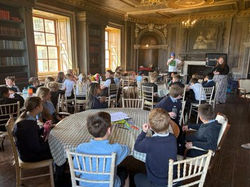Data and Performance
How do we ensure your child is receiving the very best education possible?
As a new academy school, we have not yet been inspected by Ofsted and MANY changes have occurred since the last inspection in January 2017, which can be viewed here.
We have a robust self-evaluation system in place and constantly strive for excellence.
Our staff are highly motivated in making our school a hub for learning where all children are able to achieve.
How do we self evaluate?
-
Child Centred Plans
-
Data Analysis
-
Observation of Teaching & Learning
-
Peer to Peer Coaching
-
Work Scrutiny
-
Pupil Progress Meetings
-
Continuing Professional Development (CPD)
Our School Improvement Goals
-
To develop outstanding behaviour for learning
-
To refine our curriculum design
-
To fully embed English Mastery
-
To fully embed Maths Mastery
What this looks like in the classroom
-
A minimum of "Good" teaching throughout the school
-
Quality resources
-
Consistency in all areas
-
Outward thinking learning themes
-
Good attainment
-
Good progress
-
Parent/Carer and school collaboration
-
Examples of both our learning values and Christian values in action
-
Children being Ready, Respectful, Safe
2018-2019 Data Headlines
End of Key Stage 2
Writing: 90.1% of children reached Age-Related Expectation, 18.2% of whom achieved Greater Depth
Reading: 100% of children reached Age-Related Expectation, 63.6% of whom achieved Greater Depth
Maths: 90.1% of children reached Age-Related Expectation, 18.2% of whom achieved Greater Depth
SPaG: 90.1% of children reached Age-Related Expectation, 45.5% of whom achieved Greater Depth
History at Kiveton Park Meadows Junior School
At Kiveton Park Meadows, history is an essential part of our curriculum, helping children explore the past and understand how it shapes the present and future. Through our Learning Means the World Curriculum, we aim to develop pupils’ historical knowledge, curiosity, and critical thinking skills.
Our Goals
Our history curriculum equips children with the skills to ask questions, evaluate sources, and investigate historical events and figures. Pupils learn to think critically about the past, understand different perspectives, and reflect on the impact of historical events on societies and cultures.
Why History Matters
Studying history enriches children’s educational experience and helps them develop empathy, responsibility, and an awareness of different cultures and eras. Learning about the past allows pupils to understand the present and make informed choices for the future.
Our History Curriculum
History is taught through thematic units, combining historical knowledge, enquiry, and practical activities. The curriculum fosters understanding of chronology, key events, and influential figures, helping children develop the skills to analyse and interpret evidence.
How History is Taught
History is delivered through a mix of:
-
Subject knowledge and key concepts
-
Historical skills and enquiry, including evaluating sources and evidence
-
Fieldwork and hands-on learning, both inside and outside the classroom
-
Role-play and drama, bringing historical events and figures to life
What We Learn About
Pupils explore a wide variety of topics, including:
-
Wars (World Wars, Civil Wars)
-
The Ancient Greeks
-
The Inuits
-
Roman Empire and Invasions
-
The Saxons and Vikings
-
The Mayans and Benin
-
Famous historical figures
-
Broadcasting, Technology, and the Internet
-
Animation
-
The Moon Landing
-
The sinking of the Titanic
-
Significant local history figures/events
-
Apartheid / Anti-Semitism
-
Discovery of America / Native Americans
-
Democracy and Legacy
Key Historical Figures
We study influential people such as:
Thomas Edison, Pocahontas, Walt Disney, Neil Armstrong, Roman Emperors and rulers, Ragnar Lothbrok, Harold Godwinson, Martin Luther King, Nelson Mandela, Rosa Parks, Winston Churchill, and various other world leaders.
Supporting Every Learner
Adaptations ensure all pupils, including those with SEND, can engage fully with the curriculum using historical artefacts, visual storytelling, simplified texts, and sensory activities. Handling replica objects, exploring costumes, and interactive activities help make history tangible and engaging.
Pupil Voice
“I enjoy learning all about the things that have happened in the past. It defines the human race and how we exist today.”
“I loved learning about the Stone Age in Year 3 because we read a book about it first. But you also have places like Stonehenge and the Orkney Islands where there’s evidence of the past too.”
“I like learning about people’s diaries from the wars. For example, Anne Frank.”
“We can’t wait to do the trial about the Pendle Witches!”
“I just love history! It’s very entertaining!”
“I like hearing about things from a long time ago.”
“I liked learning about the Vikings because they were red-headed, strong and fought in battles.”
Showcase
 |  |  |
|---|---|---|
 |  |  |
 |  |  |
 |  |  |
 |  |  |
 |  |  |
 |

